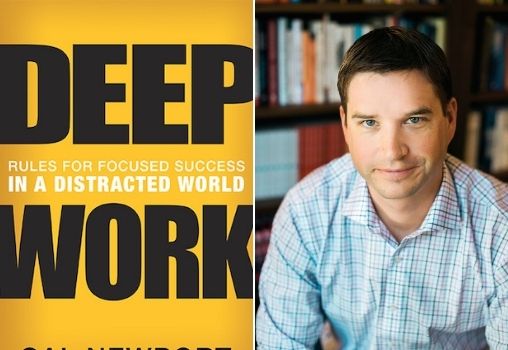In a highly capitalist world, the demand for being productive is the essence of a fast-moving society. Where each individual is expected to contribute to the existing knowledge systems. While some professionals are able to add significant value to the prevailing economic and knowledge structures, yet large chunks are not as productive.
This book of Cal Newport Deep Work: Rules for Focused Success in a Distracted World, extensively deals with the issues, of why some people can do more than the rest?
“If you don’t produce, you won’t thrive—no matter how skilled or talented you are.”
Professor of Computer Science at George Town, besides his academic endeavours, Newport has been a renowned author and a motivational speaker. Author of six books, two of which have been proclaimed as bestsellers by the New York Times, his work has been published in over 25 languages, featuring across major publications. Like his previous works, the book under review is a serious critic of digital consumerism and culture.
Writing about the intersection of digital technology and culture, the author has made an attempt to unearth how these tools can serve out value instead of accidentally subverting them. Coining the deep work hypotheses, through his work, Newport advocates for a sober living free from digital distractions.
“Who you are, what you think, feel, and do, what you love—is the sum of what you focus on.”
As economies have shifted and became digitized, our priorities have changed. To paraphrase Newport, the reason why knowledge workers are unfamiliar with the concept of deep work is quite obvious the network tools. Yes, you heard it right, all electronic gadgets that we are carrying in our pockets, giving us ubiquitous access to social media platforms, and different infotainment websites, like BuzzFeed and Twitter, are a hindrance in the growth of an individual.
“In this new economy, three groups will have a particular advantage: those who can work well and creatively with intelligent machines, those who are the best at what they do, and those with access to capital.”
According to the author, these network tools fragments the attention of most knowledge workers, making them inefficient or less productive. In modern economies large number of people, due to digital distraction, are doing what Newport calls, shallow work. A non-cognitively demanding task, which adds little or no value in the world. To put it more aptly, in this DIGINOMY, that is to say in the technology-driven economy, people are increasingly replacing deep work with shallow work, resulting in decreased productivity. To make matters worse, big conglomerates and businesses are pushing their employees to have the necessary social media presence at work, leading to distraction.
A large effort that could have served better in deep thinking which would have proven beneficial for laying new strategy for businesses or for writing grant applications, in the words of the author, is being thwarted due to shallow work. These fragmented dashes caused by the overuse of network tools are costing businesses and individuals. So, to overturn the negative impact of network tools, on the thinking process, the author proposes the idea of deep work, in his book.
Divided into two parts, the first half outlines the definition of deep work. As per the author, contrary to shallow work, deep work is cognitively demanding and requires long, uninterrupted thinking. In the twenty-first century, where people are forgetting the art of thinking deeply, and short attention spans due to digital distraction, are a common phenomenon, this book redirects individuals to the importance of long, and sustained focus.
“Great creative minds think like artists but work like accountants.”
If deep work or deep thinking is accomplished successfully by someone, it is likely that they will be able to enhance their productivity. Or at least, this is what the author intends to convey to his readers when he gives examples of some of the famous individuals who have gone on to make a name for themselves. So, to put it more precisely, what the author wants to say is that for focused success in a distracted world, an individual needs to pursue a path of deep work, free from the lures of digital distraction.
To encourage readers into action, the author devotes much of the second part in the book to actions which a layman could follow for attaining focused success in a distracted world. Merely on a personal level, I respectfully disagree with the author’s insistence on quitting all forms of technology during deep work, as I feel deep work is a state of mind that does not require any necessary prerequisite to intrude the thinking process of an individual. But without going into the nitty-gritty of human behaviour psychology and without being too critical about the author, I would say it is a good book that everyone should read before arriving at any conclusion. As it is said, interpretation of text lies with the reader. So, I will leave it for the readers to decide for themselves.
